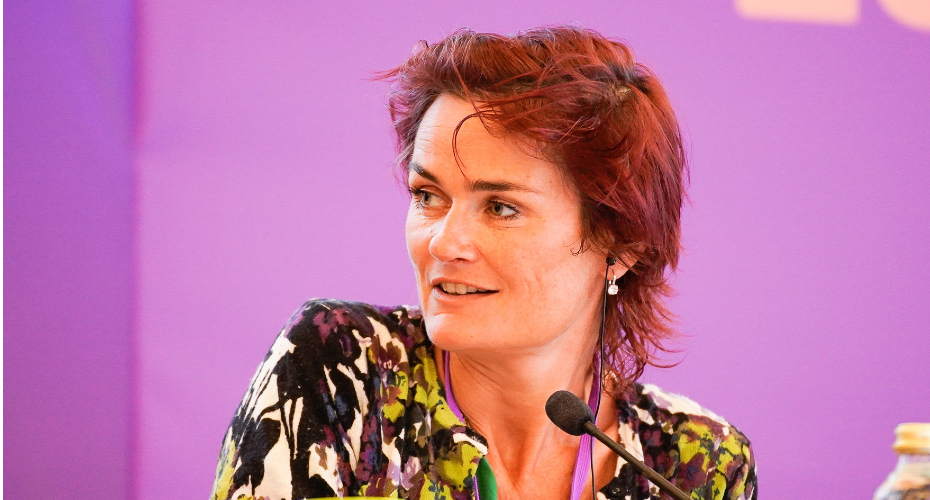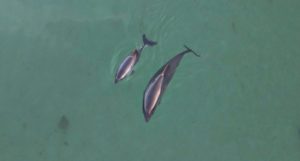Penryn Perspectives: Dr Joanie Willett

“’People like me’ so rarely get a chance to build a career like this. But having the University here in Cornwall, well, I feel I have been incredibly lucky.”
Dr Joanie Willett
Dr Joanie Willett is Associate Professor in Politics, and co-director of the Institute of Cornish Studies. Her work focuses upon the relationship between people, how they organise into communities, and the landscape in which they are situated. Through her research, she engages with regional development, careers education, devolution, local government, and the politics of sustainable clothing, and regularly works alongside bodies and organisations outside of higher education to ensure her work has an impact in Cornwall and beyond. This is perfectly demonstrated by her most recent research, the ESRC-funded What Kind of Career Can I Have Locally, and Shared Prosperity Funding which works with the Cornwall and Isles of Scilly Careers Hub and other organisations to examine ways to encourage primary age children in rural regions to consider career pathways in the local economy.
In the second in a series of Penryn Perspectives, Joanie reflects upon her journey into higher education, and how her personal experiences have influenced her research career.
“My family has been in Cornwall since the 1950s, when my grandfather moved everyone down. I grew up near Wadebridge and had an upbringing that was very much in keeping with the Cornwall of the 1980s, when wages were low, incomes were severely depressed, and life was tough. And I was that kid that had to leave school early because they’d become pregnant at the age of 16.
“It was a good few years later that I was able to return to education, which perhaps came as a bigger shock to my family than when I announced I was expecting a baby! I enrolled on a law course at Cornwall College at a time when Further Education was free, mature students were encouraged, and you could access free childcare cover through the European Structural Fund. I stayed on at the College, studying a Combined Social Sciences degree, and I knew immediately that that would not suffice. Although I had no idea at that time what postgraduate education entailed, I was interested in some of the courses offered by the University of Exeter. I enrolled on a Masters at the Exeter campus – which was brilliant – and was then lucky enough to get funding for a PhD. Of course, that meant commuting from my home in St Austell, but again I was lucky because I had family that could help with childcare.
“In academia, there is an expectation that you should be geographically mobile, and you should move around to different institutions. That is fine and great for many people, but when you are a single parent, it’s tough, especially if you are relying on your local network of family and friends to support with childcare.
“It was around this time, however, that Penryn was being developed, and in 2010, I secured my first job there. It transformed everything. Being able to work somewhere where I could be a single parent and have an academic career was incredibly important. And it’s been wonderful to watch the campus grow, with a vibrant community of colleagues from around the world, who bring so many fascinating perspectives.

“Much of my work – from my PhD, which focused on economic development in Cornwall, to the research I do on how the duchy is presented and represented through stories – is rooted in that lived experience of growing up here. The image of Cornwall, based upon the visitor experience, has little bearing upon those who are trying to build their lives here. There is a belief that ‘to get on’ means that you have ‘to get out’, and an assumption among Cornish professional middle classes that their fellows have lived away for some time – probably somewhere exciting – before coming back. This creates a stigma around those who stay – which is completely unjust for young people.
“I do not want my children to feel that they must leave to build a life. And we as a university have a role to play here in breaking through the language and comprehension barrier that exists, helping ordinary people to see that the Cornish economy is not just tourism, but one containing pioneering renewable energy companies, a vibrant marine and engineering sector, and an astonishing clothing sector. It is rural innovation at its absolute best. We can help people to understand what type of skills are marketable in the contemporary Cornish workplace and how to find those jobs – jobs which, incidentally, are attracting young people INTO the region!
“It is about challenging those self-perpetuating myths and striving to find new mechanisms to tell different stories.”



